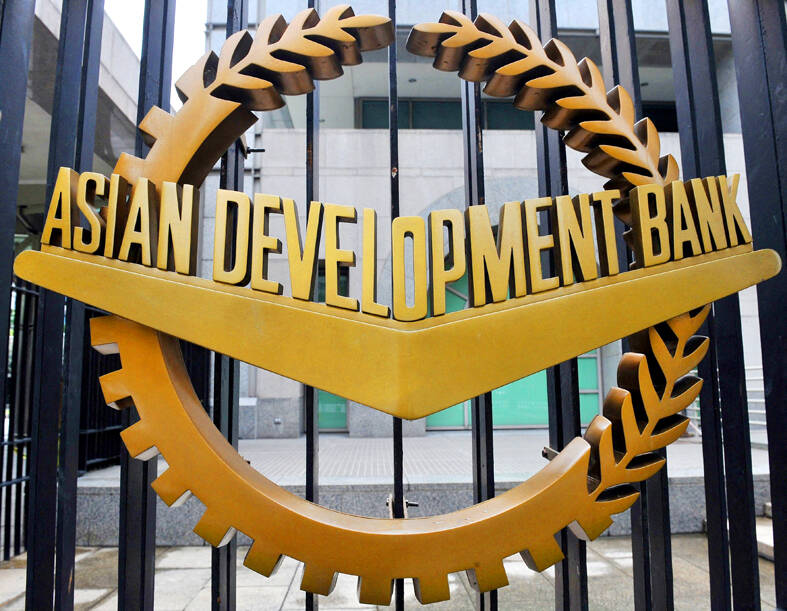The Asian Development Bank (ADB) has raised its growth forecast for Taiwan’s economy from 3 percent to 3.5 percent this year, as strong global demand for electronics is boosting exports, particularly semiconductors used in advanced technology and artificial intelligence (AI) applications.
GDP expanded by 6.6 percent in the first quarter, led by a 9.1 percent rebound in exports buoyed by strong demand for electronics and AI-related goods, the ADB said in a report on Wednesday.
Imports grew by 0.8 percent, resulting in a net gain of 5.5 percentage points in external demand to GDP growth, the bank said.

Photo: AFP
At the same time, private consumption moderated slightly and private investment remained weak, but has likely bottomed out and would stay on a course of gradual pickup this year, the ADB said.
However, export growth displayed signs of mitigation in the second quarter, judging by a 9.9 percent advance that missed the Directorate-General of Accounting, Budget and Statistics’ forecast by 4.6 percentage points, while imports grew faster at 12.7 percent, Ministry of Finance data showed earlier this month.
The figures suggest that growth momentum would moderate year-on-year moving forward, as the low base effect fades away, the ADB said.
That is because consumer spending would slow down further, but private investment would pick up in a modest fashion, helped by the uptick in exports, it said.
While inflation is moderating toward pre-COVID-19 pandemic levels in the region as a whole, price pressures remain elevated in some economies, the ADB said, adding that it stands by its inflation forecast of 2.3 percent for this year.
Most regional central banks continue to hold policy rates steady although easing is gathering pace, it said, pointing out that 30 percent of monetary policy decisions in the first half of this year were rate cuts, compared with 14 percent for last year.
Taiwan and Indonesia bucked the mainstream by hiking rates to cool inflation expectations and support its currency respectively, the ADB said.
The ADB raised its forecast for GDP growth in developing Asia and the Pacific from 4.9 percent to 5 percent this year, as other economies such as South Korea also benefit from the positive global technology cycle.
“Most of Asia and the Pacific are seeking faster economic growth, compared with the second half of last year,” ADB chief economist Albert Park said in the report.
The region’s fundamentals hold strong, but policymakers still need to pay attention to a number of risks that could affect the outlook, from uncertainty related to election outcomes in major economies to interest rate decisions and geopolitical tensions, Park said.

Nvidia Corp CEO Jensen Huang (黃仁勳) is expected to miss the inauguration of US president-elect Donald Trump on Monday, bucking a trend among high-profile US technology leaders. Huang is visiting East Asia this week, as he typically does around the time of the Lunar New Year, a person familiar with the situation said. He has never previously attended a US presidential inauguration, said the person, who asked not to be identified, because the plans have not been announced. That makes Nvidia an exception among the most valuable technology companies, most of which are sending cofounders or CEOs to the event. That includes

TARIFF TRADE-OFF: Machinery exports to China dropped after Beijing ended its tariff reductions in June, while potential new tariffs fueled ‘front-loaded’ orders to the US The nation’s machinery exports to the US amounted to US$7.19 billion last year, surpassing the US$6.86 billion to China to become the largest export destination for the local machinery industry, the Taiwan Association of Machinery Industry (TAMI, 台灣機械公會) said in a report on Jan. 10. It came as some manufacturers brought forward or “front-loaded” US-bound shipments as required by customers ahead of potential tariffs imposed by the new US administration, the association said. During his campaign, US president-elect Donald Trump threatened tariffs of as high as 60 percent on Chinese goods and 10 percent to 20 percent on imports from other countries.

Taiwanese manufacturers have a chance to play a key role in the humanoid robot supply chain, Tongtai Machine and Tool Co (東台精機) chairman Yen Jui-hsiung (嚴瑞雄) said yesterday. That is because Taiwanese companies are capable of making key parts needed for humanoid robots to move, such as harmonic drives and planetary gearboxes, Yen said. This ability to produce these key elements could help Taiwanese manufacturers “become part of the US supply chain,” he added. Yen made the remarks a day after Nvidia Corp cofounder and chief executive officer Jensen Huang (黃仁勳) said his company and Taiwan Semiconductor Manufacturing Co (TSMC, 台積電) are jointly

MARKET SHIFTS: Exports to the US soared more than 120 percent to almost one quarter, while ASEAN has steadily increased to 18.5 percent on rising tech sales The proportion of Taiwan’s exports directed to China, including Hong Kong, declined by more than 12 percentage points last year compared with its peak in 2020, the Ministry of Finance said on Thursday last week. The decrease reflects the ongoing restructuring of global supply chains, driven by escalating trade tensions between Beijing and Washington. Data compiled by the ministry showed China and Hong Kong accounted for 31.7 percent of Taiwan’s total outbound sales last year, a drop of 12.2 percentage points from a high of 43.9 percent in 2020. In addition to increasing trade conflicts between China and the US, the ministry said